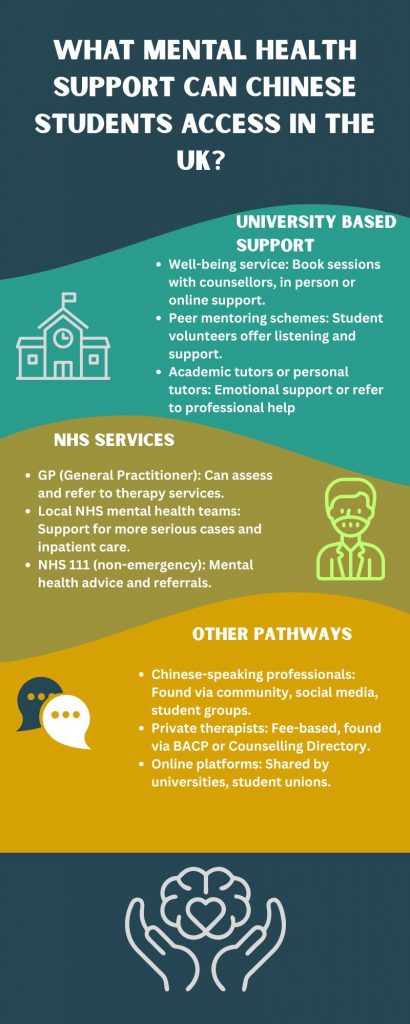Research shows that Chinese students face many challenges when seeking mental health support in the UK. What are their experiences when asking for help?

In 2022, Fan travelled from Shanghai to the University of Exeter to begin her postgraduate studies. At that time, the pandemic had not completely faded in the UK, making the journey difficult for her. Just a few days after arriving, Fan tested positive for Covid-19.
She had a high fever and stayed in bed all day. With no friends around to help, and still unfamiliar with how to get support from university and local hospital, she found herself in a difficult situation. Fan had previously experienced mental health problems in China, and the illness triggered an emotional crisis. She started calling her family in tears and said she wanted to go home.
“I really didn’t know what to do at that time. I had just arrived, I didn’t know anyone, and I didn’t know how to contact a doctor. I was sick in bed every day and felt my mental health problems coming back. I became very anxious. I couldn’t sleep and could only eat cold sandwiches. The whole situation had a strong effect on my mental state,” says Fan.
Two weeks later, Fan’s physical condition was getting better, but her mental state remained the same. Every day in classes, she could temporarily stop overthinking, but once she returned to the flat, the thoughts would come back. She had brought medicine for depression from China and took it every day.
“I took the medicine every day during that time. It was the only thing that helped me feel more stable. But I couldn’t always stay with friends or stay on campus. Whenever I was alone in my flat, things would start to feel harder again,” says Fan.
Her story reflects a wider situation among Chinese students in the UK, where many of them also face ongoing struggles with mental health problems. Some Chinese students overseas, including in the UK, have reported symptoms of anxiety and depression, showing the presence of mental health problems in this group, according to an article from ScienceDirect in 2023.
Fan was not alone. Other students also describe how mental health problems disrupted their studies and daily lives in similar ways. “Emotions had a strong impact on my life and studies. I could hardly eat every day and found it difficult to finish my assignments. It felt like being stuck in a downward cycle. In the end, I had to force myself to eat something because I knew that if I continued like that, I might starve to death,” says Ian, a Chinese student from the University of Birmingham who experienced mental health problems while studying in the UK.
When Fan saw no better change in her mental state, she decided to make an appointment with a local GP. But the waiting time became a problem to her. “After briefly looking into mental health support services in the UK, I booked an appointment with a GP,” she says, “but the whole process took a long time. I waited for over a month to hear back from them. In the end, the call came when I had almost forgotten about it.”
Ian also faced the same problem when trying to get help from a GP. “I felt strong dislike toward the GP system because I failed to register several times, and in the end, it took nearly two months before I could see a doctor,” he says.
However, these personal stories reflect a national challenge, the long waiting time for GP appointments is a common problem in the UK. Many patients say it is increasingly hard to get a GP appointment, according to an article published in the BMJ in 2023. In addition, each month in England, more than five million people wait over two weeks to see a GP, according to an article from The Guardian in 2024.
When local health services failed to respond quickly, Fan turned to the university for help. She started looking for mental health support services on her university website. She found a counseling department and managed to book an in-person session.
During her conversation with the staff, she struggled with the language barriers. “In China, I thought my English was good, but when I tried to explain my situation to the staff, I found I could not describe my feelings accurately in English and did not know some mental health terms. I was not sure if the staff understood what I meant,” Fan says.
Fan’s difficulty in expressing her feelings is not unusual. Not only Fan faced language barriers when seeking help in the UK, but many Chinese students even gave up seeking mental health support because of language problems. Language barriers are one of the common obstacles for East Asian students when they seek mental health support, according to an article published in PubMed Central in 2025. Especially, some Chinese students give up or hesitate to seek help because of difficulties in using English, according to a research published in 2023.

Among Fan’s friends, some did not want to seek mental health support because of language barriers, and they preferred to ask Chinese people for help. “One of my friend also had mental health problems. She did not seek help from UK specialists because she was worried she might not understand the doctors. Instead, she found a Chinese doctor on social media,” says Fan.
Apart from language barriers, Fan also hesitated before seeking help from the university. She felt it was difficult to tell a stranger that she had mental health problems. “Sometimes I feel that having mental health problems is not a good thing and may cause others to think badly of me. Because of this, I hesitated for a long time before seeking help from the university,” says Fan, “In China, many people still hold negative views about mental health problems.”
This hesitation is linked to a broader cultural view. Fan’s view of mental health is common among Chinese people. This sense of shame affects the chances of Chinese students getting help in the UK. In Chinese communities, negative views about mental illness are still strong, these views can stop people from telling others about their struggles, according to an article published in PubMed Central in 2013.
These negative feelings help explain why the number of Chinese students attending support services remains low. “Compared to the overall student population, the number of Chinese students seeking counseling is low,” says Dr. Erla Magnusdottir, who previously worked at King’s College London, “I once spoke with counseling services at several universities, someone showed me some figures about how many Chinese students had come that year for the counseling service, and when compared to the total number attending the university, it was relatively low.”
In addition, some Chinese students may feel pressure when many people know that they have mental health problems. “After I asked for mental health support at the university, I was told to send emails to all my teachers to explain my situation. I felt very afraid because I did not want so many people to know that I had mental health problems. In the end, my supervisor sent emails for me,” says QiQi, a Chinese student from SOAS, University of London.

However, support did not always feel accessible. After receiving support from the university, Fan began following mental health support pages from UK universities on the internet and social media, hoping to find ways to ease her feelings. But she found that many of these pages contained too much text and information, which made her feel tired when reading.
“Although I found some useful information about mental health on these pages, I felt they have too much information. When I was already tired because of emotional problems, I did not want to spend more time reading these texts in English. I just wanted to quickly find the information that could help me,” she says.
Fan’s feeling is supported. Many university websites have the problem of information overload, and when students face a large amount of information, it may affect their use of the websites. Students often experience digital overload when confronted with large amounts of information on online platforms, which can affect how they engage with online resources , according to an article published in Social Sciences in 2021.
Fan also looked for help outside the university, but faced new problems. She contacted a specialist working at an institution and sent emails to both him and the institution to request an appointment, but she did not receive a reply.

“After sending the email, I kept waiting for a reply, but two weeks passed without any response. In the end, when I carefully checked my mailbox, I found that the specialist had actually replied, but I had missed it because there were too many promotional and junk emails,” says Fan.
Fan’s unfamiliarity with using email reflects a situation among Chinese students, which may cause them to miss important replies. “Some students are not very familiar with using email, because in some ways they are more used to tools like WeChat, and they are not used to checking email every day. I am not saying most of them cannot figure it out, but even this kind of practical issue can become a barrier to keeping in touch with other people,” says Dr. Magnusdottir.
Through the experience of seeking mental health support in the UK, Fan developed some understanding of the support system. But as a Chinese student student, she believes UK universities need to do more.
“I think the university should pay more attention to our mental health and make some changes based on the needs of Chinese students, so that the experience of Chinese students in seeking help will improve,” she says.